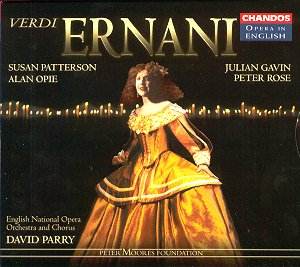Giuseppe VERDI (1813 - 1901)
Ernani - Opera in four parts
Ernani, a bandit ... Julian Gavin (tenor)
Don Carlo, King of Spain ... Alan Opie (baritone)
Don Riccardo, the King's equerry ... Peter Wedd (tenor)
Don Ruy Gomez de Silva, a Spanish grandee ... Peter Rose (bass)
Elvira, his niece and betrothed ... Susan Patterson (soprano)
Giovanna, her nurse ... Helen Williams (soprano)
Jago, Silva's equerry ... Paul Hodges (bass)
English National Opera Orchestra and Chorus / David Parry
Recorded Blackheath Halls 12 - 16 July 2000 DDD
CHANDOS OPERA IN ENGLISH CHAN3052(2) CD1 [66.50] CD2 [65.11]
Crotchet AmazonUK AmazonUS Amazon recommendations

It cannot be a coincidence that the title on the sleeve is written in letters of gold: for so it was on the banner at la Fenice, Venice for the first production. The first performance, and even more so the second, left the audience in raptures. So will this recording. Yet, it is not perfect. But nor was the first performance.
Now let us return to the beginning. Verdi's first four operas were all produced on the large stage of La Scala, Milan. Generalisations can be dangerous and/or misleading but with that caveat, those operas were primarily works for chorus. Verdi determined to show his skill for the individual at which he was to become a master craftsman. In this his earliest such work, written for a more intimate theatre, the characters are comparatively simply portrayed with little of the multi-faceted qualities that were to be evident in later operas; but the musical qualities required are anything but simple. Melodies abound; voices are stretched; passion and volatility are never far from the surface.
Fortunately David Parry is in firm control. The pacing throughout is disciplined with some quite superb phrasing and changes in tempo. Every musical nuance is extracted. For those who think foot-tapping or even, when alone, taking the imaginary baton and conducting, is infra dig then do not purchase this CD - and if you do then skip "You're Ernani…" (CD1 track 15) and " Ah forgive me sire…" (CD1 track 22). To demonstrate the breadth of the orchestral performance compare the evocative opening of Part III (not Act) at the tomb of Charlemagne and the haunting images of death, with the quite excellent and very entertaining party "band" played superbly in the background, at the start of Part IV.
As Ernani, Julian Gavin's clear rich tone shines throughout the opera, the highest notes demanded appearing to be achieved almost effortlessly. The bandit hero, a dispossessed noble seeking to avenge the death of his Father becomes hostage to the sound of his own horn. Gavin makes every word and note clear and compelling.
The Spanish code of honour is essential to parts of the plot development. It rules the life of de Silva, a Spanish Grandee, the guardian of Elvira. It is hardly surprising he is peeved when he finds two suitors in her chamber in his castle not least because he intends to marry her himself. D'Artagnan style he demands to duel with both, successively of course. Later the code causes him to decline the King's demand to surrender a guest (Ernani) because a guest has his protection. He accepts Ernani's horn and oath that upon sounding it Ernani will take his own life which oath he enforces at the end of the opera.
Peter Rose is a powerful Grandee with all the necessary gravitas. His diction (and that of the entire cast) is totally clear. Here we do not need the libretto. My only reservation is that I imagine de Silva as an exquisitely mannered but somewhat vitriolic character ready to tilt at anything. Such tetchiness is only apparent on a few occasions: for example, upon discovering Ernani and Elvira declaring their love for each other. The mellow tone of Alan Opie fills the role of Don Carlo with majesty. The vocal interplay between him and Peter Rose could not be bettered.
Thus far the cast of this recording are the cast for some/all the performances at the Coliseum in which Sandra Ford sang Elvira. On this recording Susan Patterson replaces her. This is no easy role - slightly more complicated as a character and at least as vocally difficult as her male counterparts. Her breath control is quite excellent. Mostly she delivers the highest notes with remarkable clarity and beauty of tone. Sadly occasional shrillness creeps in which detracts. That is my only serious vocal reservation. Peter Wedd, Helen Williams and Paul Hodges support with vocal deference and dignity. The chorus is at all times crisp.
Unfortunately I have one or two (nit-picking) comments on the libretto. Rarely would I question a translation but was Ernani really "abandoned" by his comrades. Not according to Don Carlo relating the event to de Silva saying they were "scattered". Surely they were defeated or some such word for otherwise this runs counter to the "all for one and one for all" of the somewhat banal but extremely well sung opening. Also when Elvira and Don Carlo leave de Silva, the Heaven watches over Elvira not Don Carlo. There are also one or two "sillies". Elvira hurries "in" not "out" before the reference to the threatened torture of Ernani; and it is Riccardo who relates the election of Don Carlo as the Emperor not the conspirators.
That said the accompanying booklet is informative and helpful. There is a compact history of the gestation of the opera, comparison with Victor Hugo's play and a placing in historical context.
Trivial reservations aside consider the grand scheme of things. Let us not play de Silva or even Ernani and constrain ourselves with minutiae. Play Don Carlos who was to bestride a huge stage stretching from Hungary to Peru. Such a grand overview says that this is a splendidly welcome addition to the growing band of opera sung in English.
Robert McKechnie